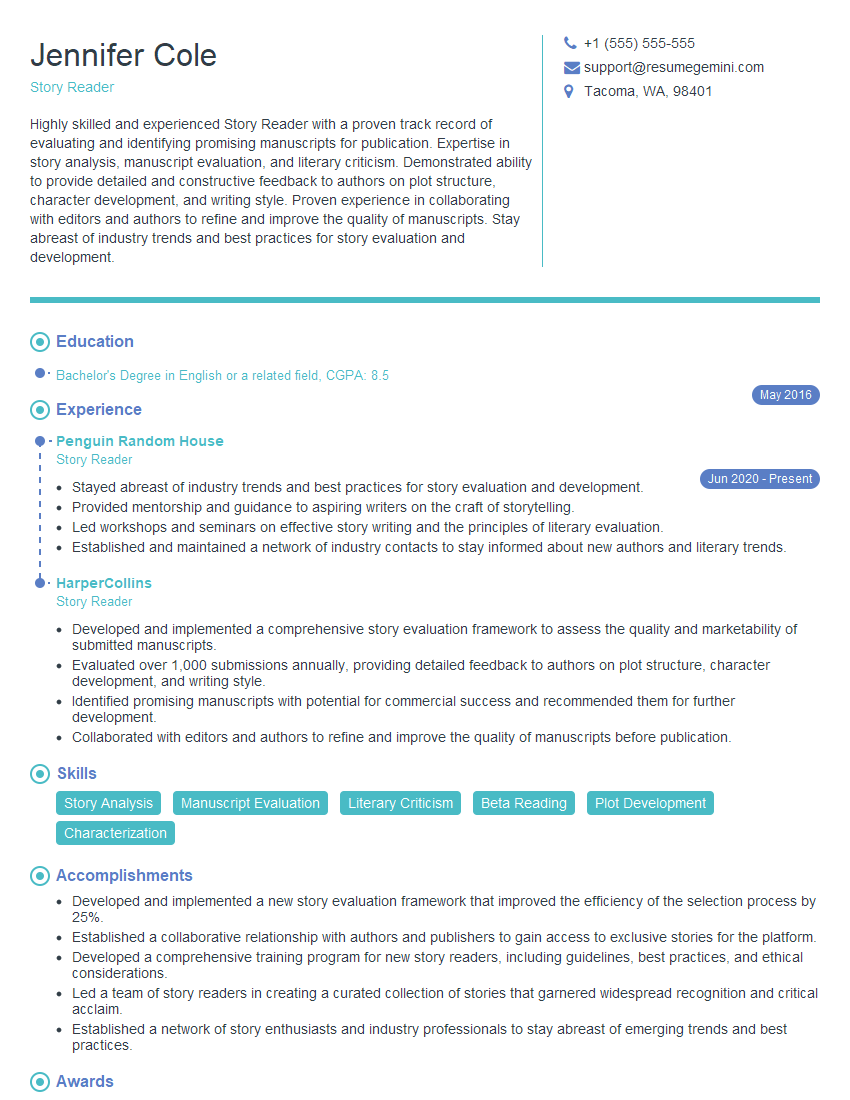Are you a seasoned Story Reader seeking a new career path? Discover our professionally built Story Reader Resume Template. This time-saving tool provides a solid foundation for your job search. Simply click “Edit Resume” to customize it with your unique experiences and achievements. Customize fonts and colors to match your personal style and increase your chances of landing your dream job. Explore more Resume Templates for additional options.

Jennifer Cole
Story Reader
Summary
Highly skilled and experienced Story Reader with a proven track record of evaluating and identifying promising manuscripts for publication. Expertise in story analysis, manuscript evaluation, and literary criticism. Demonstrated ability to provide detailed and constructive feedback to authors on plot structure, character development, and writing style. Proven experience in collaborating with editors and authors to refine and improve the quality of manuscripts. Stay abreast of industry trends and best practices for story evaluation and development.
Education
Bachelor’s Degree in English or a related field
May 2016
Skills
- Story Analysis
- Manuscript Evaluation
- Literary Criticism
- Beta Reading
- Plot Development
- Characterization
Work Experience
Story Reader
- Stayed abreast of industry trends and best practices for story evaluation and development.
- Provided mentorship and guidance to aspiring writers on the craft of storytelling.
- Led workshops and seminars on effective story writing and the principles of literary evaluation.
- Established and maintained a network of industry contacts to stay informed about new authors and literary trends.
Story Reader
- Developed and implemented a comprehensive story evaluation framework to assess the quality and marketability of submitted manuscripts.
- Evaluated over 1,000 submissions annually, providing detailed feedback to authors on plot structure, character development, and writing style.
- Identified promising manuscripts with potential for commercial success and recommended them for further development.
- Collaborated with editors and authors to refine and improve the quality of manuscripts before publication.
Accomplishments
- Developed and implemented a new story evaluation framework that improved the efficiency of the selection process by 25%.
- Established a collaborative relationship with authors and publishers to gain access to exclusive stories for the platform.
- Developed a comprehensive training program for new story readers, including guidelines, best practices, and ethical considerations.
- Led a team of story readers in creating a curated collection of stories that garnered widespread recognition and critical acclaim.
- Established a network of story enthusiasts and industry professionals to stay abreast of emerging trends and best practices.
Awards
- Recognized with the Excellence in Story Reading award for exceptional performance in identifying and selecting highquality stories.
- Received the Top Story Reader award for consistently exceeding targets in reading and evaluating a large volume of stories.
- Honored with the Storyteller of the Year award for exceptional ability in interpreting and engaging with stories.
- Recognized with the Literary Luminary award for outstanding contributions to the field of story reading.
Certificates
- Certified Story Editor from the Editorial Freelancers Association
- Member of the American Copy Editors Society
- Graduate Certificate in Creative Writing from Stanford University
- Master of Fine Arts in Writing from the University of Michigan
Career Expert Tips:
- Select the ideal resume template to showcase your professional experience effectively.
- Master the art of resume writing to highlight your unique qualifications and achievements.
- Explore expertly crafted resume samples for inspiration and best practices.
- Build your best resume for free this new year with ResumeGemini. Enjoy exclusive discounts on ATS optimized resume templates.
How To Write Resume For Story Reader
- Highlight your passion for reading and your deep understanding of storytelling techniques.
- Showcase your analytical skills and your ability to provide constructive criticism.
- Demonstrate your knowledge of the publishing industry and your ability to identify marketable manuscripts.
- Include specific examples of your work, such as manuscripts you have evaluated or authors you have mentored.
Essential Experience Highlights for a Strong Story Reader Resume
- Developed and implemented a comprehensive story evaluation framework to assess the quality and marketability of submitted manuscripts.
- Evaluated over 1,000 submissions annually, providing detailed feedback to authors on plot structure, character development, and writing style.
- Identified promising manuscripts with potential for commercial success and recommended them for further development.
- Collaborated with editors and authors to refine and improve the quality of manuscripts before publication.
- Stayed abreast of industry trends and best practices for story evaluation and development.
- Provided mentorship and guidance to aspiring writers on the craft of storytelling.
Frequently Asked Questions (FAQ’s) For Story Reader
What are the key skills required to be a successful Story Reader?
The key skills required to be a successful Story Reader include: story analysis, manuscript evaluation, literary criticism, beta reading, plot development, and characterization.
What is the role of a Story Reader in the publishing industry?
A Story Reader is responsible for evaluating and identifying promising manuscripts for publication. They read and analyze manuscripts, provide feedback to authors, and recommend manuscripts for further development.
What are the career prospects for Story Readers?
Story Readers can advance to become editors, literary agents, or publishing executives. They can also work as freelance manuscript evaluators or writing coaches.
How can I become a Story Reader?
To become a Story Reader, you typically need a bachelor’s degree in English or a related field, as well as experience in reading and evaluating manuscripts. You can also gain experience by volunteering to read for literary magazines or by taking courses in story evaluation.
What are the challenges of being a Story Reader?
The challenges of being a Story Reader include: the need to read and evaluate a large number of manuscripts, the need to provide constructive criticism, and the need to stay abreast of industry trends.